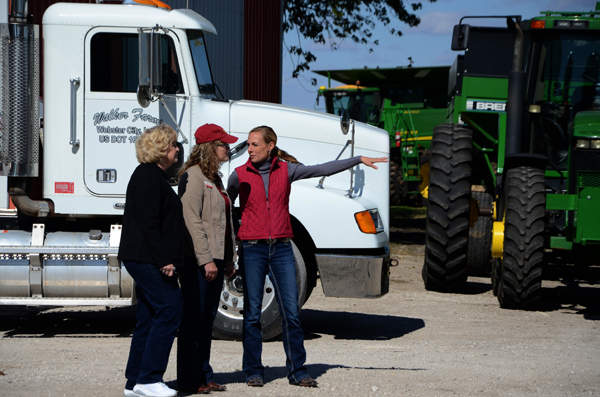
Crucial Conversations: Managing For Today And Tomorrow
“I don’t think it’s worth it,” says Patty Walker. She sits across the kitchen table from her daughter-in-law, Kris Walker, on a bright October morning. One look out the picture window and it is obvious harvest is in full swing. Patty is making reference to something she has seen too much – families being torn apart over the dispersion of the family farm. “It breaks my heart when I hear people fighting over an estate. My family is the most important thing and I don’t want it broken up over land,” she says.
This was the driving force behind her decision to attend an Annie’s Project course – Managing for Today and Tomorrow – in Ames with Kris (’00 animal science) in 2012. It was part of a new curriculum supported by the Beginning Farmer and Rancher Development Program of the National Institute of Food and Agriculture, USDA. Madeline Schultz, Women in Agriculture program manager, with Iowa State University Extension and Outreach in the Value Added Agriculture office facilitated the course.
“Like Kris and Patty, many farm women are central to farm family communication. Managing for Today and Tomorrow was designed to help farm women talk with family or other business partners about business, estate, retirement and succession,” says Schultz. “Successfully transitioning land, other assets, management and labor to the next generation takes good planning over several years,” she says.
Patty takes the course workbook along when she meets her lawyer. It’s just the compass she needs to navigate unfamiliar topics and terms and also prompts her to ask questions she would have never thought to ask. “I pick up something new every time,” she says.
Annie’s Project is a national educational program dedicated to strengthening women’s roles in farming. Over the past ten years courses have been taught in 34 states. In Iowa the program is administered by Iowa State University Extension and Outreach. Annie’s Project fosters problem solving, record keeping and decision-making skills in farm women and connects women to their local resources.
Since taking the transition planning course, Patty and her husband, Jim, have updated their will. Patty, a mother of four and grandmother of nine, stresses the value of succession planning, “You need to think about it before you’re sick. Along with our will, we have a living will to explain why we have things the way they are.” Although only Kris’s husband, Bill, plans to farm, the course compelled Patty to meet with each of her children individually to help them understand the transition plans.
“The best part was the ride home from the course,” Patty remembers, smiling at Kris, “Kris and I would talk non-stop and plan how to communicate what we learned.” Later, Patty would lay in bed at night talking to Jim about things discussed in class. “I could not stop talking about what I learned,” she laughs. It prompted conversation about retirement, a topic Jim often avoided. “That conversation wouldn’t have happened without this course,” says Patty.
“We’re confident we have a basis as far as information or places to go for information,” says Kris. Patty nods and chimes in, “And we’ve at least had a conversation.” Managing for Today and Tomorrow and other Iowa State extension courses they’ve taken have helped them work towards successfully transitioning the Walker family farm to the next generation.



